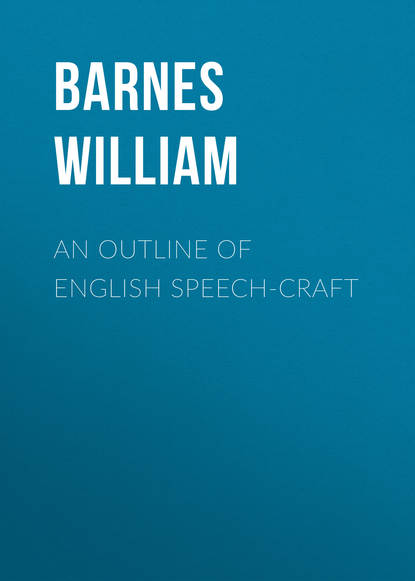По всем вопросам обращайтесь на: info@litportal.ru
(©) 2003-2024.
✖
An Outline of English Speech-craft
Настройки чтения
Размер шрифта
Высота строк
Поля
Shall.—Sceal-an, meant, as a stem, to offmark, distinguish, or to skill in the meaning of 1 Kings v. 6 – ‘Ic sceal dón,’ I offmark or skill to do; as what I am bent to do.
‘Thou shalt love the Lord thy God.’ Thou markest or clearly seest to love the Lord thy God.
‘Thou shalt not steal.’ Thou markest this. Not to steal.
Must.—Mot-an, most-an, is most likely a stem of the word mag-an, to strongen (valere).
The -st would strengthen the meaning of mag (may) as it does in -est of longest. So ‘I must go’ (Ic moste gán) would mean ‘I am overmighted by another’s might to go.’
Time-words are fitted
To Mood, as
I write, or shall write.
I may or can write, or might or could or should write.
If I write, or if I had written.
Things and Time-takings
Timing of time-takings is the marking of their times, as now, heretofore, or hereafter.
Time.
Now or hereat.
I am, or I love, or am loved.
Heretofore done.
I was, or I loved, or was loved.
Heretofore ongoing.
I was, or I was a-loving or I did love.
Now ended.
I have been, or I have loved, or have been loved.
Heretofore ended.
I had been, or I had loved, or had been loved.
Heretofore ongoing, ended.
I had been a-loving.
Hereafter doing.
I shall be, or I shall love, or shall be loved.
Hereafter ongoing.
I shall be a-loving.
Hereafter ended.
I shall have been, or shall have loved, or shall have been loved.
Hereafter ended, ongoing.
I shall have been a-loving.
Single and stringly time-takings of the same name, as ‘Mary sold me some apples yesterday.’ There was a single selling; but under the wording ‘Mary formerly sold apples in the market,’ it is clear that under the same word sold is meant a string of sellings.
So under the wording ‘Write your name’ is understood a single writing; but under the wording ‘If you would write readily, write every day,’ the same word write implies a string of writings.
Some tongues (as the Greek and Russian) have two shapes of the time-words for these two cases of time-taking; as, Greek —
‘Take thy bill and write fifty’ (γράψον, aorist). – Luke xvi. 6.
‘Jesus, stooping down, wrote on the ground’ (ἔγραφεν, imperfect, ondoing shape, wrote on).
See the Greek text of the 3rd Epistle of John v. 13 – ‘I had many (things or many times?) to write (γράφειν, ondoing shape), but I will not with pen and ink write (γράψαι) to thee’ (aorist, offdoing form).
An understanding of the difference between the aorist and ondoing shapes is of weight in the reading of the Gospel. ‘To make intercession, to intercede for them.’ – Heb. vii. 25. To intercede once for all, at the doom-day? No. To intercede on always; for the word is not in the aorist shape, but in the present ondoing form, to be interceding.
Historic Time-wording.
A time-shape of a time-word used in an unwonted way for the telling of a string of deeds, as, in English, the present time-shape is so used for deeds of foretime, as ‘He opens the door, walks in, coolly takes a chair, sits down, and tells the maid he wishes to see me.’
So ‘Philip findeth Nathanael, and saith unto him,’ &c. – John i. 45.
The Moods of Time-takings.
Mood.
The wording of the time-taking may be; as,
(1) Now or heretofore true, or hereafter sure, as ‘He is, or was, or will be’; ‘He sings, or sang, or will sing.’ The Truth Mood.
(2) That it may or can, or could or might be so taken, as ‘He may or can go.’ The Mayly Mood.
(3) Or that it is to be wished that it may or might be taken, as ‘I wish,’ or ‘Oh that I could go.’ The Wish Mood.
Or that it is a hinge time-taking on which another hangs, as ‘If you ask (hinge), you will receive (on-hang).’





